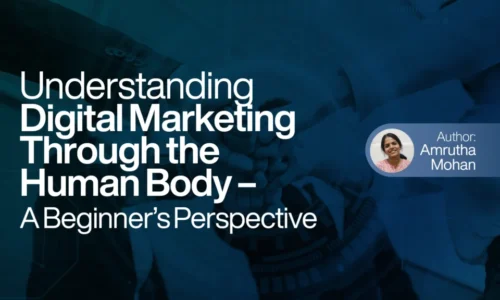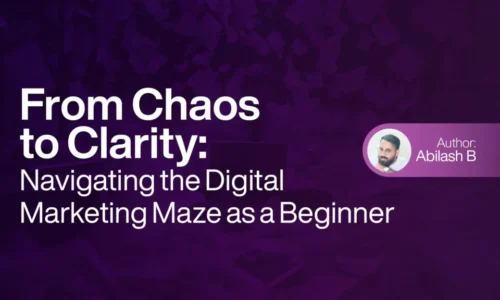Boosting Self-Confidence in Digital Marketing: A Simple Guide
In the fast-changing world of digital marketing, confidence is key to success. With new trends, shifting algorithms, and growing competition, even experienced marketers can feel uncertain. But confidence isn’t just about experience – it comes from continuous learning, strategic thinking, and adaptability. By building knowledge, taking creative risks, and making informed decisions, digital marketers can stay ahead and navigate challenges with clarity. Whether you’re just starting or have years of experience, developing self-assurance will help you execute campaigns effectively and grow in the industry. So, how can you boost your confidence in digital marketing? Let’s break it down.
Table of Contents
1. Introduction- The Role of Confidence in Digital Marketing
Confidence is essential for success in digital marketing, where creativity, adaptability, and data-driven decisions shape outcomes. Self-doubt can hold marketers back, making it harder to launch campaigns, analyze results, or engage effectively with audiences. However, confidence isn’t just about experience- it’s built through continuous learning, strategic practice, and a willingness to adapt. This guide explores practical ways to develop and maintain self-assurance, helping you navigate challenges and execute marketing strategies by developing the right skills, embracing challenges, and making data-driven decisions, marketers can strengthen their self-assurance and stay ahead in this competitive field.This guide provides actionable strategies to help you build and sustain confidence, empowering you to navigate digital marketing with clarity and conviction.
2. Understanding the Digital Marketing Landscape – Key Challenges and Opportunities
The digital marketing landscape is dynamic, with constant updates in algorithms, advertising platforms, and consumer behavior. Marketers must navigate challenges such as competition, content saturation, and performance fluctuations. However, these challenges also bring opportunities – by understanding market trends and leveraging innovative strategies, professionals can stay ahead and build their confidence in the industry.
3. Build Knowledge and Expertise – The Power of Continuous Learning
Confidence in digital marketing comes from a strong foundation of knowledge and skills. Keeping up with key areas like SEO, PPC, content marketing, social media, and email marketing is essential to staying competitive. Engaging in online courses, attending webinars, reading industry blogs, and gaining hands-on experience can significantly enhance expertise. The more you learn, the more equipped you become to make informed decisions, adapt to changes, and execute effective strategies with confidence. Continuous learning not only reduces uncertainty but also empowers you to innovate and stay ahead in the ever-evolving digital landscape.
4. Developing a Strategic Mindset – Planning, Execution, and Adaptability
A well-planned strategy provides clarity and boosts confidence. Marketers must define goals, set clear objectives, and develop actionable plans. Execution should be flexible to accommodate market changes. Being adaptable- willing to test, analyze, and optimize – ensures continuous growth and resilience in digital marketing.
5. Overcoming Self-Doubt – Managing Imposter Syndrome and Fear of Failure
Many digital marketers experience imposter syndrome, doubting their abilities despite their achievements. Overcoming this requires recognizing personal growth, celebrating small wins, and understanding that mistakes are learning opportunities. Building confidence involves shifting from a fear-based mindset to a problem-solving approach.
6. Effective Communication and Personal Branding – Establishing Authority in the Industry
Confidence is reinforced by visibility and credibility. Whether through content creation, networking, or thought leadership, marketers can establish their expertise. Writing blogs, engaging on LinkedIn, and speaking at events help build personal branding, creating a strong professional presence that enhances confidence.
7. Leveraging Tools and Analytics – Making Data-Driven Decisions with Confidence
Digital marketing is driven by data. Understanding tools like Google Analytics, SEMrush, and social media insights helps marketers make informed decisions. By tracking performance, identifying patterns, and optimizing strategies, professionals can improve their results and confidence in their skills.
8. Staying Updated with Trends – Adapting to the Evolving Digital Ecosystem
The digital marketing world is evolving rapidly. Keeping up with industry trends – such as AI-driven marketing, voice search, and automation – ensures relevance and preparedness. Continuous learning through reputable sources, newsletters, and conferences enhances adaptability and confidence.
9. Networking and Community Engagement – Learning from Industry Experts and Peers
Confidence is strengthened by engaging with industry experts and peers. Networking, joining digital marketing communities, and participating in discussions provide insights, feedback, and support. Learning from others’ experiences builds knowledge, inspiration, and professional relationships that boost confidence.
Conclusion – Strengthening Confidence for Long-Term Success
Confidence in digital marketing is not something gained overnight – it is a continuous process of learning, adapting, and growing. As the industry evolves with new technologies, trends, and consumer behaviors, marketers must embrace change with a proactive mindset. The key to sustained confidence lies in ongoing education, refining strategic thinking, and improving communication skills to build credibility and authority.
Moreover, confidence is reinforced through hands-on experience, experimentation, and data-driven decision-making. Every challenge presents an opportunity to learn, and setbacks should be viewed as stepping stones toward growth. Engaging with industry experts, networking with peers, and staying updated with market trends also contribute to a strong foundation of self-assurance.
By consistently applying these principles, digital marketers can overcome self-doubt, make informed decisions, and take creative risks that drive meaningful results. Confidence enables professionals to execute campaigns effectively, adapt to changes with ease, and position themselves as industry leaders. With persistence and a growth-oriented approach, marketers can maximize their impact and achieve long-term success in the ever-evolving digital landscape.



